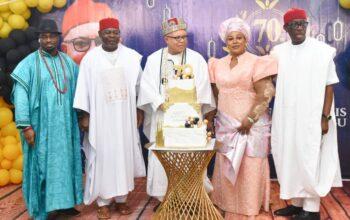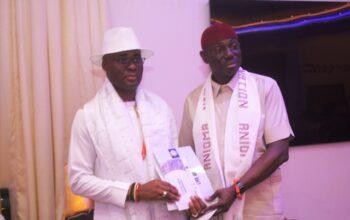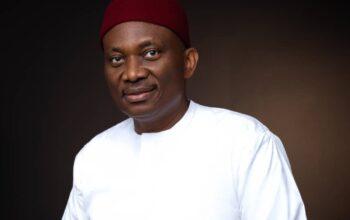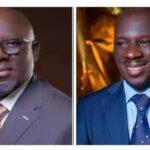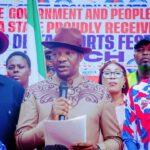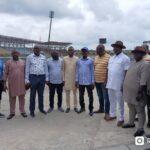The Minority Leader of House of Representatives, Rt. Hon. Ndudi Elumelu has noted that in a democratic setting like Nigeria, free, fair, transparent and credible election remains the fundamental way through which citizens enforce their choice of leadership as well as their participation in their welfare, development and security needs.
Elumelu stated this yesterday 17th July, 2021 while delivering a lecture at the 5th Biennial Convention of the ‘Class of 84’ of St. Pius Xth Grammar School, Onicha Ugbo, Aniocha North, held at De Gellys Hotels, Umunede in Ika North East Local Government Area of Delta State.
In his lecture, titled “The Role Of Enhanced Electoral Awareness In improving The Quality Of Leadership In Nigeria”, Elumelu posited that the concept of electoral awareness was also a broad spectrum covering various areas of enlightenment and participation in electoral, political and governance activities.
He said electoral awareness had been defined as a process of sensitizing the citizenry on the imperativeness of participating in the electoral process as well as ensures a responsive, responsible and democratic government that focuses on their development need.
“It further involves the process of providing the citizens with vital information about the underlying ideologies and manifestos of political parties and their candidates in such a way that enables them to assess their electoral worthiness and cast their votes from an informed point of view.
“The concept also entails efforts to enlighten citizens on electoral laws, constituency delineation, use of technology, voting processes as well as issues of voter accreditation, balloting, protection of votes, result collation and access to information on election results”.
“It also covers the deliberate process of sensitizing the citizens to take interest in party activities, especially the nomination of candidates for elections as well as how to hold political parties and elected leader responsible for their actions and inactions. This would include enlightenment on how to enforce redresses and sanctions such as impeachment and recall of elected officials,” the Minority Leader added.
According to Elumelu who represents Aniocha/Oshimili Federal Constituency in the House of Representatives, electoral awareness could be done through a number of channels including, government policies, public lecture, symposiums, town hall meeting, school subjects, books, pamphlets, flies, political rallies, road shows, media interviews, talk shows, news, news analysis and commentaries; jingles, music, bill boards, inscription on wears and vehicles, souvenirs, inter-personal interactions, among others aimed to inform and enlighten the citizens on electoral processes.
While stressing that there was a fundamental link between electoral awareness and quality of leadership because elected leaders were more responsive to deliverables in the face of a politically aware citizenry, the House of Reps Minority Leader noted that, the more the citizens are electorally aware and take steps to enforce the essentials of such awareness, the better the quality of leadership for their benefit.
He disclosed that poor electoral awareness breeds poor electoral choices which, in turn, produce poor leadership to the doom of the people and the nation which appears to be the challenge our nation was currently facing at various levels of governance.
On awareness deficit in the Nigerian electoral process, Elumelu disclosed in his lecture that, Extra-Civic Voting Pattern Analysis Further survey indicated that more than half of the 84 million registered voters in 2019, enlisted for other reasons other than, or were inhibited from certain factors from, participating in the election.
He uphold the view that many of such individuals apparently registered as voters in other to obtain the voter card as a means of identification for education, business or social purposes while some were coerced to obtain the cards to gain or retain employments, or access to certain politically motivated benefits.
He revealed that Nigeria has a predominantly illiterate and semi-literate population, which Surveys indicated that of the 28.6 million that actually participated in the election, more than 50 percent were not very conversant with the provisions of the 1999 Constitution (as amended) as well as the Electoral Act, with regard to electoral processes, the rights and powers of voters and scope of citizens’ participation in holding government accountable.
“A greater percentage of the voters are not also conversant with the constitutions, ideologies, manifestos of the contesting political parties. Such individuals do not also peruse and interrogate the backgrounds, antecedents and manifestoes of candidates for elections at various levels.
“Further examination indicates that a larger percentage of the 28.6 million voters voted along the lines of ethnicity, religion and political party affiliations and not along the lines of merit and electoral worthiness of the candidates.
“Moreover, observations have also shown that not less than 45% of voters participate in elections in Nigeria out of coercion or economic inducement, including vote buying by politicians and political parties, who compel them to vote in a direction other than their convictions of electoral worthiness of candidates and political parties.
“Though the Electoral Act prohibits vote buying in Nigeria, poverty, illiteracy, poor electoral awareness and desperation by politicians and political parties, have contributed in making the practice prevalent and playing key roles in elections in Nigeria.
“It is instructive to note that such situation of massive voter apathy, illiteracy, poor electoral awareness, tribal, religion and partisan preferences, cultural inhibitions voter suppression, coercion, vote buying, lack of exposure to statutorily guaranteed rights including holding leaders accountable, cannot guarantee the desired quality of leadership”. Elumelu stated in his lecture
The highlight of the St, Pius Xth Grammar School Onicha-Ugbo ‘Class of 84’ 5th Biennial Convention with the theme “Closer Ties, Stronger Future” which attracted high level personalities from all over the world were award presentation to deserving members that have made impact in humanity and Governance.
|
|
|||||



